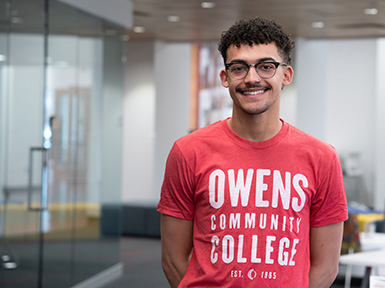Owens Community College Nursing Program Surpasses State, National Rates

KJ Hardeman
The way others treat you can have a profound impact on your life. When KJ Hardeman’s infant nephew died, how the Pediatric Intensive Care Unit (PICU) at Toledo Children’s Hospital cared and treated his family inspired him to become a nurse.
Hardeman comes from a family with many relatives in the medical field. He always knew he wanted to help others, but the tragic incident shifted his focus. “The way the PICU nurses treated, not only my nephew, but my loved ones in the time of need caused me to shift my future from being a veterinarian to helping humans as a nurse,” said Hardeman, who enrolled at Owens Community College in January 2020 to pursue his nursing degree. He is scheduled to graduate in May 2023.
He cited many factors in the decision to attend Owens, including the flexibility with classes, affordability, the smaller class sizes and the personable experience. Another deciding factor, he said, was the National Council Licensure Examination (NCLEX) pass rate for Owens graduates that enables them to work as nurses. “I don’t think people realize the NCLEX pass rate at Owens is the best in the state,” said Hardeman. The NCLEX pass rates for Owens nursing graduates have surpassed the state and national pass rates since 2014. “It demonstrates the quality of education and the content our students are getting in this program,” said Cathy Ford, Dean of the School of Nursing and Health Professions.
According to the U.S. Bureau of Labor Statistics, employment of registered nurses is projected to grow 6 percent by 2031. More than 203,000 openings for registered nurses are projected each year in that same time period. Many of these opening are the result of career change or retirement. The demand for nurses will happen not only in hospitals, but also in residential care facilities and in educational settings as well.
“Having teachers that still work in the field and can tell us what exactly to expect when we step into a medical setting is a huge asset to nursing students at Owens,” Hardeman said. Owens prides itself on having a nursing faculty with an exceptional level of expertise in nursing education. “The faculty’s dedication to our students not only in the classroom but also in the lab and clinical settings truly sets our program apart from others in the area. Our faculty takes great honor in teaching the caretakers of our future,” added Ford.
In addition to nursing, the School of Nursing and Health Professions offers degrees and short-term certificates in dental hygiene, health information technology, MRI, medical assisting, physical therapist assisting, radiologic technology, sonography, surgical technology and therapeutic services. Ford said the school is setting its students apart from others through its focus on interprofessional education, which enables students to learn to work collaboratively as part of a healthcare team – and patient outcomes benefit from it. “It’s not just that we are doing something to teach our students, but teaching them to do something that matters in the community,” said Ford.
Hardeman is the vice president of Alpha Delta Nu, an honors society for nursing students. He has accepted an offer to work in the Toledo Children’s Hospital PICU. His legacy at Owens will continue following graduation as his sister has been accepted to the Owens nursing program. “Don’t let the community college name scare you off. Coming to Owens was one of the best decisions in my life,” said Hardeman.
Learn more about the Registered Nurse Program >>
Learn more about the School of Nursing and Health Professions programs and certificates >>
Published March 2023
